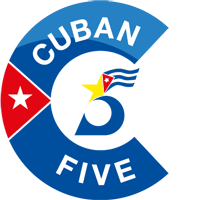|
By Edward Cuddy
This is a story of five Cuban patriots, incarcerated in American prisons for 13 years — a tale of cruelty, hypocrisy and monumental injustice reaching from a Miami court to the White House. Their odyssey began in 1959, when Cuba was subjected to invasions, sabotage and terrorist attacks initiated by Cuban exiles concentrated in Miami. By the 1990s, the militants had killed 3,478 Cubans, with thousands wounded and their economy ravaged. To stop the carnage, Havana sent five Cuban citizens to Florida to gather information on terrorist groups, hoping to persuade Washington to stop the illegal attacks. After gathering 64 files of information exposing the militants’ assaults, the Cuban government relayed it to the FBI. But instead of arresting Miami’s Cuban militants, the “Cuban Five” were arrested, charged with conspiracy to commit espionage and tried in Miami, a city seething with hostility. Despite several pleas for an impartial venue, the court rejected the defense lawyers’ request. On June 8, 2001, the Cubans were convicted and punished with draconian sentences: Gerardo Hernandez, Antonio Guerrero and Rabin Labanibo received life sentences; brothers Fernando and Rene Gonzalez were given 18 years and 15 years, respectively. In August 2005, the 11th Circuit Court of Appeals ruled unanimously to reverse the convictions and ordered a new trial. Unfortunately, the 11th Circuit Court in full session reinstated the convictions. However, the Circuit Court left behind a damning brief exposing government misconduct on several accounts. • Refusal of venue change. After considering opinion polls, newspapers and sociological studies, the three judges concluded that the entire Miami- Dade community was “repeatedly and deeply exposed” to prejudicial publicity. Dubbing Miami as a “Cuban enclave,” sociologist Lisandro Perez claimed that “the possibility of selecting 12 [impartial] citizens,” even non-Cubans, was “virtually zero.” Moreover, the jurors were harassed by groups, pressuring them to avoid reaching “a verdict unfavorable” to the militants. • Defendants’ mission. There was no evidence confirming that the defendants had spied on the U. S. government. Rather, the judges pointed toward the Cuban exile groups involved in “the terrorist actions against Cuba” while implying that the defendants’ objectives were to expose and stop the assaults on their homeland. • Prosecutorial misconduct. The prosecutor had demonized the defendants as spies “sent to . . . destroy the United States” while warning the jurors that an acquittal would betray their community. Mincing no words, the appellate judges criticized the prosecutor for statements “inflaming the jury’s prejudices”—a“reprehensible” violation of her oath of office. Their conclusion: the “convictions are reversed and we remand for a new trial.” As we have seen, however, the court in full session reversed the reversal, keeping the Cubans in chains. After President Obama’s election, hopes were high that justice would finally be served. Ten days after his inauguration, the defense lawyers petitioned the U. S. Supreme Court to reopen the case. Thousands of messages from all over the world — including 12 amicus briefs (one of them from 10 Nobel Laureates) — petitioned the Supreme Court to review the case. But in May 2009, Obama urged the Supreme Court to reject the appeal. A month later, the court rejected the case without explanation. What’s behind the atrocious treatment of the Cuban Five? For starters, consider Hernandez’s “defense statement” from Dec. 12, 2001. His right to defend his homeland from terrorism, he asserted, is “the same right that the United States has to neutralize Osama bin Laden’s organization.” After “countless acts of terrorism” murdering “my brothers and sisters . . . by individuals who freely walk the streets of this city today . . . I pledged to sacrifice even my own life [to] protect my people . . .” Delivered three months after the 9/11 terrorist attacks, Hernandez’s statement promised to expose the hypocrisy staining President George W. Bush’s “war on terrorism.” Declaring that governments that “harbor terrorists are equally guilty of the terrorist crime,” Bush declared war on Afghanistan for sheltering al-Qaida terrorists while he was sheltering Cuban terrorists in his own back yard. For half a century, Washington had been trying to undermine Fidel Castro’s communist regime through economic sanctions in tandem with violent attacks launched by Miami’s Cuban paramilitaries. In this low-intensity warfare, an honest trial could expose Washington’s complicity with Miami’s terrorists. The intense effort to conceal Washington’s sinister links with Cuban-American terrorists is highlighted by two important players: Luis Posada, CIA-trained in explosions and notorious for masterminding many terrorist attacks on Cubans, especially the bombing of a Cuban air liner killing 73 people in 1976; and U. S. Attorney Carolina Heck-Miller. Heck-Miller was the “reprehensible” prosecutor so-described by the appellate judges, who railroaded the Cuban Five into prison. But when the Department of Homeland Security asked Heck- Miller to try Posada, she rejected the request, leaving him a free man. In January, the Obama administration brought Posada to trial — for perjury, not terrorism. During the trial, Posada’s attorney threatened to ask the government to declassify information revealing the government’s “complicity in sabotage or bombing in Cuba.” The court found Posada not guilty on all charges. Now comes the latest outrage, prompted by Rene Gonzalez’s release after serving his prison sentence. Heck-Miller persuaded the Miami court to impose a three-year probation, tethering Gonzalez to Miami, putting his life in serious danger by the terrorists he had exposed. And so the tragedy continues: the loss of freedom for the Cuban Five; the assault on our own Constitution. On Sept. 12, the Cuban Five began their 14th year in confinement for trying to protect their homeland from terrorist attacks. And the Miami-based terrorists, exposed but never prosecuted, remain free under the American flag. Edward Cuddy is a professor emeritus at Daemen College and a liaison to Congress members for the Western New York Peace Center. www.buffalonews.com
0 Comments
Your comment will be posted after it is approved.
Leave a Reply. |
Voices for the FiveArchives
May 2016
|
 RSS Feed
RSS Feed

